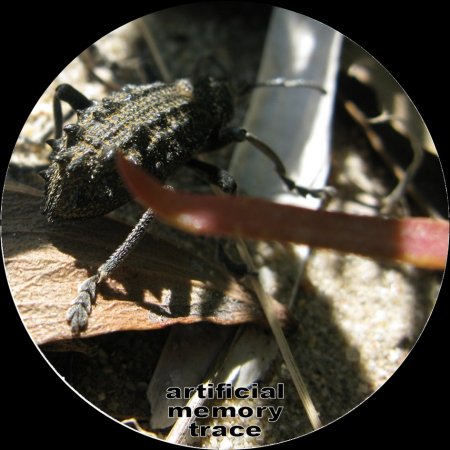
news - aim - releases - reviews - plans - links - distributors - ordering - contact

alm 87
artificial memory trace
"chitin"
(for jerome noetinger)
31 may 2012
created by
slavek kwi, ireland during july-sept 2011 from physical and
stridulation sounds of various invertebrates: termites, ants,
sting-less bees, leaf-hoppers (amazonas, brazil 2008-2009);
electric insect (pantanal, brazil 2006 + tasmania 2011); hermit
crabs (amhemland, australia 2009); bee-hive (czechie 1994).
all sounds rec. by kwi except ants inside tree-nest rec. with
francisco lopez (thanks!)
this is a commision from "les instants chavirés" (montreuil,
france) for "l'audible festival" 2011
photography : kwi
active since the early 90's, czech composer slavek kwi is considered as a master for field recordings and electroacoustic music. this piece, dedicated to metamkine's boss jerome noetinger, was commissioned for "l'audible festival" which took place at "les instants chavirés" near paris, france, in 2011. based upon various selected insect recordings made between 1994 and 2011, "chitin" will not disappoint fans of precise and carefully composed field recordings based piece.
tracklisting
:
1. chitin
reviews :
Vital Weekly 839
Hot on the heels
of the previous three (see Vital Weekly 837), another trio of 3"CDR
releases. [...]
The biggest surprise is the piece by Artificial Memory Trace,
also known as Slawek Kwi, which is hardly a drone/ambient piece,
but a collage of field recordings - very much like we are used
from him. Here to things build up slowly, but in a much more
collage like manner, with sounds dropping in and out of the mix,
until it reaches a continuous sound and things go on for some
time. A fine of what seems to me pure field recordings. Not a
surprise for Slawek Kwi, since this is 'just' another great work
from him, but quite a surprise for Taalem to release it. It may
seem off the path they have been taking for such a long time, but
perhaps it all makes great sense. (FdW)
A Closer Listen
Here’s some
really great music for the Grissoms and other budding
entomologists, as well as for students of insect symphonies.
Slavek Kwi (artificial memory trace) has produced a
remarkable sonic document in chitin, originally
commissioned for France’s 2011 “l’audible festival”.
The sheer wealth of sources on display is nearly overwhelming:
termites, leaf-hoppers, electric insects and many more, whose
sounds were collected on excursions to Australia, Brazil and the
Amazon. Francisco Lopez even contributes some bee-sounds.
The crunchiest sounds may be those of hermit crabs, but who
knows? Suffice it to say that these creatures do not play
well together, but Kwi creates a virtual concourse in which they
can interact without venom.
Similarly remarkable is the proximity of these timbres to those
of drone and glitch. While listening to chitin, it’s
easy to theorize that the genesis of each genre rested in fields
and swamps, in long, hot summers and the curious sounds of the
natural and hungry insect world. The 1971 science fiction
documentary The Hellstrom Chronicle posited a planet in
which the insect life ran amuck, unchecked by pesticide and
scavenger intervention; in days, the human race was gone. Even
more frightening than the images were the ravaging sounds: hordes
of maws and pincers, unfeeling and unrelenting. chitin possesses
a bit of that warning; the attention necessary to develop such a
recording, to shape its sharp edges into an antennaed structure,
is also a plea to live in harmony with the natural world, rather
than to attempt to eradicate its annoying denizens for no other
reason than to increase our immediate comfort.
And shape Kwi does, from the speaker-to-speaker introductory
clicks to the amplified rubbing of feelers, from swift buzzes to
inner hives, from near-silence to the sound of swarms. At
times, he turns his sources on and off like musical notes; at
other times, he allows them to unspool like single-instrument
solos, or in the busiest segments, like choirs. These are
the sort of sounds most people seek to avoid, to snuff out or to
spray, but Kwi gives them their due. When the bees arrive
en masse at the midway point, they bring to mind the plagues of
the apocalypse, but with an awful beauty.
Not every soundscape is meant to be benign. There are only
so many recordings of oceans and birds that one can take without
getting bored and wandering outside to hear the real thing.
chitin stands out because it does more than simply
present a host of carefully-arranged field recordings; it exposes
our own prejudices, pre-conceptions and animosities. Sure,
we love nature, we say, except for the bugs. The
lovingly compiled chitin is good enough to begin
changing our minds. (Richard Allen)